QuestionQUESTION: Hi, Max is home. We brought him home yesterday at about 6 pm. He met my other two dogs and it seems like they accepted him. My white shepherd female is especially fond of him. My dogs have one water bowl and he wants to drink from their bowl, which worries me because I don't want him to catch something that they may be immune to. He is very smart( I am sure you hear that a lot ). I made sure he relieved himself outside for the first time and every time he had to go, he'd jump on the door. For the night, I put him in his crate, which he hates. Everytime I put him in there, he has a fit for five minutes and then he goes to sleep.
I fed him last night. He ate but not very much. He woke up every three hourt last night and we went outside. He'd pee and poo each time. Then there was a fit when I put him back in his crate for about 5 minutes and then he'd fall asleep. I woke up at 12:00, 3:00, 6:00 and 9:00 with him. This morning I checked and he had diahrrea. His first stool at 10:00pm wasn't too bad. It was kind of half and half but the later ones were definately diahrrea. There's no change in color. The color is yellowish. I let him drink however much water he wanted.
He had his third set of shots last Monday and he is due for another worming next Saturday. The breeder told me to bring him in on July 10 when he'll be 4 months old for the last set of shots so technically he still can't go to dog park or meet dogs until July 10th. The breeder sent me home with antibiotics ( in case he gets congested ), Metryl for diahrrea. Here's my question, could the diahrrea be the result of him getting stressed from being in the new place? Should I give him that medication the breeder gave me? He does not look sick, he's walking around, playing with his toys, is very alert. I can't get in touch with the breeder till tomorrow, should I just wait until tomorrow?
ANSWER: Hello Agata,
Glad you finally have Max and sorry to hear he is having problems.
YOUR OTHER DOGS
As long as your other dogs are up to date with their shots and healthy you should fine be with your pup being around them. Your main concern around other dogs is there are many out there who are not healthy or up to date with their shots and those are the ones you want to keep your dog away from. That would include their feces if out on a walk.
The first thing that I ask when puppies have diarrhea is have you changed to a different food or water than the breeder was feeding?
SWITCHING FOODS or WATER CAUSES DIARRHEA IN PUPS
If you have switched to a different dog food the pup will require time to get used to this change and will show symptoms of the diarrhea until he has adjusted. A food switch is a common reason for diarrhea in pups. Their sensitive digestive system just can't handle the change very well and they do get diarrhea when being placed on something different at any time in their first year or so. Pups can also react to a change in Water. It sounds like your breeder expected this by sending along some medication for and it would be wise to give it too him so he does not get dehydrated. However, if that be the case I'm surprised your breeder didn't tell you how to avoid diarrhea in your pup with a gradual switch in foods or providing water from the kennel! (I suspect this will be the main cause.)
As for the antibiotics for congestion... I'm surprised the Breeder sent this unless they are accustomed to their dogs getting this after they leave. I would not give this unless your dog is getting symptoms of congestion and I would consult with a vet. If your breeder is NOT A VET they should NOT be providing an antibiotic. This would be practicing medicine without a license.
EATING PLANTS CAN ALSO CAUSE DIARRHEA
Another common reason for diarrhea in pups is from poisoning from eating plants that are harmful to the pup (indoors or out) A list of these can be found in the help section of my website. It will take some time for the diarrhea to go away after you have found the source.
WHAT TO DO IF SWITCHING FOODS
When switching dog foods, puppies do not tolerate a sudden switch and this usually causes diarrhea. In order to avoid this it is recommended to make the switch gradually.
Feed 75% old food and 25% new food for a few days,
then 50% Old and 50% New for another few days
then 25% old 75% new another few days
Then finally 100% New.
If you don't have access to the food the Breeder gave the diarrhea will continue until your pup adjusts. The diarrhea could last more than a week if that be the case but less severe as time goes on.
THINGS TO CONSIDER WHEN CHOOSING A PUPPY FOOD
When choosing a food for your dog keep in mind that German Shepherds increase their birth weight by approx. 70 times by 15 months of age. As pups, they tend to double their weight each month.
Your pup will require a puppy food made especially for the needs of a growing large breed puppy and for the special needs of your German Shepherd who have issues with joints and the digestive system. There are many large breed puppy foods on the market today. Find a premium one you can trust to ensure your dog is getting the proper nutrients he requires.
I feed Royal Canin Premium Dry Dog food. It comes in 40 pound bags and is a little more expensive than others, but my dogs absorb more of the food they eat thus eating less than many other brands. They offer the 40 lb bag rather than the 35 lb. A small puppy may go through 1 bag in 2 months. It has immune boosters also.
Royal Canin also offers buy nine bags get the 10th free at retail outlets. Ask Your retail Outlet About this. (You will need to keep your receipts and the bar codes from the bags you have purchased.) In the end I find this dog food well worth the price, a very good deal and provides peace of mind.
A Video Clip Regarding German Shepherd Special Dietary Needs
http://www.royalcanin.ca/library/files/dog/gs.wmv
For Info on Royal Canin Large Breed Puppy (under 15 Months) Designed specifically for the growing needs of the Large Breed Dog. http://www.royalcanin.ca/products/hn/maxi/puppy_en.php; and
For Info German Shepherd (Over 15 Months)- Royal Canin makes a dog food designed specifically for the special needs of the adult German Shepherd. http://www.royalcanin.ca/products/hn/breed/german_en.php
GENERAL RULES WHILE POTTY TRAINING
Your pup will need to go to the bathroom as soon as he wakes up from a nap and within 1 hour after eating. Pups are creatures of habit and will have to go to the bathroom approx. every hour during the day. I let mine out the minute they wake up and then approximately every hour throughout the day. The Bowel movements usually take place when they wake up in the morning, 1 hour after eating (there is usually more than one) It takes them some time to move around a little before they complete their movements. Its a good idea to train your dog now where to go. Going outside with your pup on a lead, tossing a ball a little will ensure he moves around enough to have to go. Once he's trained where to go, you won't have to go out with him every time. Potty training is all about reading your dog and knowing is schedule. Ensure your pup is supervised when out of the crate. Usually, when given too much room in the house, without supervision, potty training will be more difficult.
Avoid free feeding dog foods. Place the food out at meal time, make sure your pup eats appropriately and has what he wants. My general rule is to leave the food out 15 minutes (if the pup is still eating or hungry during that time, I give him more). Then remove the bowls after mealtime. A puppy who has to go hungry at mealtimes a couple times, will learn to eat at mealtime. This process also helps you to monitor what your pup is eating, and will help you if you have any weight loss issues.
A puppy who has diarrhea could have an issue with weight if it continues.
CONSULT WITH YOUR VET
If you believe you have found the source and the diarrhea continues consult a vet.
Hope Max does better soon!
Sincerely,
Gallant German Shepherds
http://www.gallantshepherds.com
---------- FOLLOW-UP ----------
QUESTION: The breeder feeds Professional Breeders Formula and he insists on adding cooked food to the dry food. He says this diet has worked for him very well and his shepherds have had no diseases associated with the breed. He says adding 3oz. of cooked ground chicken, one soft boiled egg, 3 steemed carrots, a clove of raw garlic, 1 tsp. of cod liver oil, 1 tbs of plain yogurt, some alfalfa sprouts, and a spoon of powder dog supplement with selenium and brewesters yeast and some vitamins keeps his dogs looking beautiful and keeps them healthy. He then puts all those ingredients in a blender and then soaks the dry food in it and serves it to the dogs. I have to admit it smells great! I bought the dry food from him and he sent me home with a two day supply of the cooked stuff so I fed that to the puppy yesterday and again today. So he did not have a change in his food at all.
I managed to get in touch with the breeder today and he told me to give Max the anti diahrrea medication he sent home with me. His stools are still a little loose but the frequency has decreased. He also told me this could be caused by a change in drinking water or by stress.
Any ideas on how to help Max start liking his crate? He is very good out of the crate but the minute I put him in it and close the door, he panics, hyperventilates and throws a fit which lasts a couple of minutes. Then he falls asleep. He ate in his crate this afternoon but he feels much more comfortable eating outside the crate. Because of my other dogs, he needs to eat in his crate or they'll eat his food for him.
Fortunately, I am on vacation for the next two months so by the time I go back to work again we should be able to resolve all of Max's puppy problems. Thanks to your excellent service!!!
AnswerI do agree with the diet your breeder feeds his dogs and feel that diet is highly recommended. Many People however are not able to provide that kind of time to their dogs or have the ability to cook for them consistently. For that Reason I recommend a Premium Kibble. Puppies get diarrhea when their diets are changed so careful consideration should be made about how much money and time one has when deciding on a dog food.
I hope Max is feeling better now both emotionally and physically.
Further to our telephone discussion, I recommended that you review the crate training articles on my website which can be found at http://www.gallantshepherds.com/help.htm I also advised I was writing an article on the subject, but due to a family emergency I have not been able to complete it in time to answer your question.
Your dog needs to be eased into the crate with practice given regularly throughout the day.
As recommended, play outside the crate, have him sit or lie down outside the crate and treat when he obeys your commands. Try throwing some of the treats inside the crate to see if he'll go in to get them.
Treat, praise and pet your dog for going inside his crate.
Consider placing a blanket with your scent on it inside the crate.
Be sure the crate is in or around the place you spend your most time such as the family room.
Place favorite toys inside the crate. I put bullys, a kong and a plush squeaky toy with my scent in the crate.
When your dog is in the crate with the door closed, stay close for about 10 minutes, then let your dog out.
Practice this a number of times. Then try alternating with leaving the room for about 10 minutes.
Slowly leave your dog longer and longer. Do Not let your dog out when whining. This will only teach your dog to whine to get out.
However, sometimes your dog will whine to get out to eliminate. Ask your dog Your Command for this. If your dog gets more excited. Take your Dog immediately outside. This should not be a play time, but should be all business. Outside to go then back in the crate.
More tips can be found on the recommended articles on my help page.
Dogs usually get over these reactions in a few days. If the behavior remains or becomes severe consider reading the article on the help page on my website regarding Separation Anxiety or If Your Dog is Afraid to assist you with behavior modification and socialization techniques to help your dog overcome his anxiety.
Hope this helps. Wishing You and Max All The Best
Sincerely,
Gallant German Shepherds
http://www.gallantshepherds.com

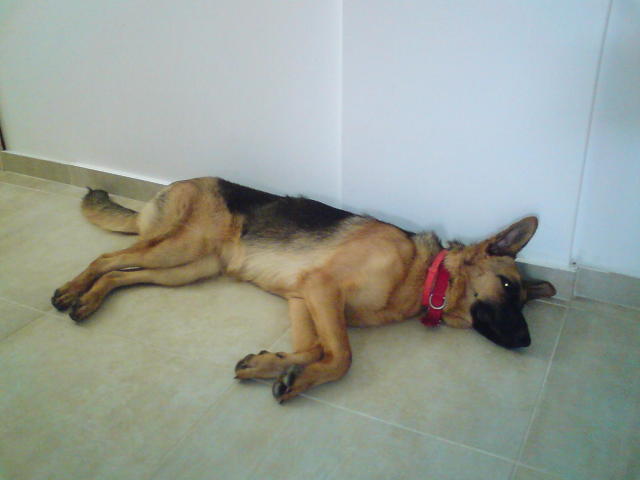 puppy growing thin and tall
Question
Lying down
Hi, I have a 9 month old German She
puppy growing thin and tall
Question
Lying down
Hi, I have a 9 month old German She
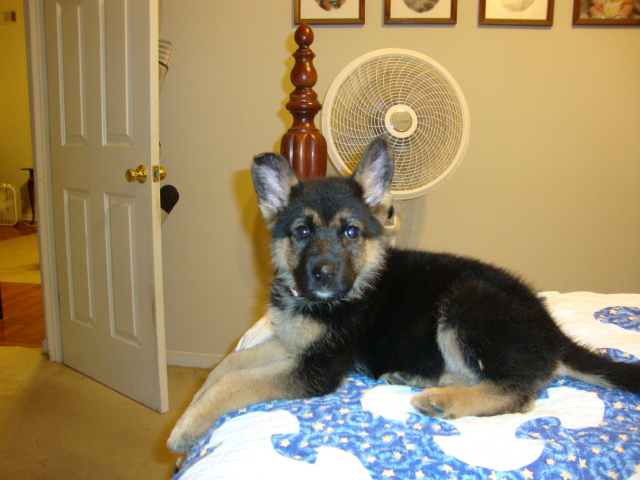 puppy wont eat
Question
ava 8weeksweeks
i have a purebred german sheph
puppy wont eat
Question
ava 8weeksweeks
i have a purebred german sheph
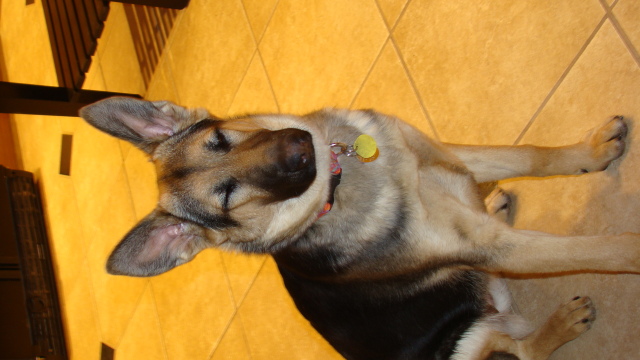 tymber
Question
tymber
ok my gsd is now 7 months old and i hav
tymber
Question
tymber
ok my gsd is now 7 months old and i hav
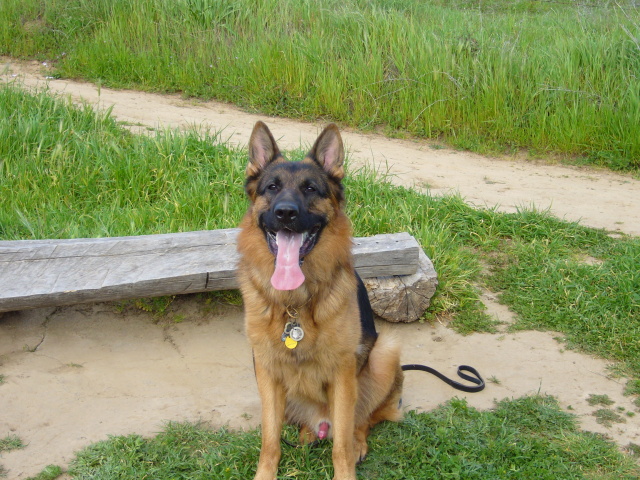 Aggression
Question
Ray
Hello, I need help...I lost my female GSD
Aggression
Question
Ray
Hello, I need help...I lost my female GSD
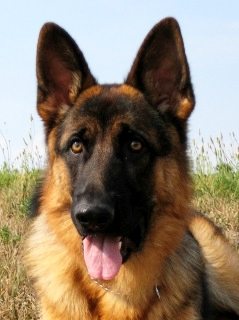 2yo German Shepherd Male
Question
My Boy...
Hi there....I have a 2 year old, pur
2yo German Shepherd Male
Question
My Boy...
Hi there....I have a 2 year old, pur